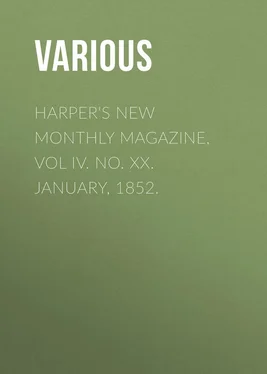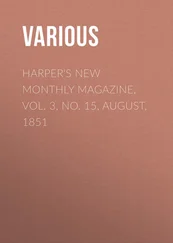Various - Harper's New Monthly Magazine, Vol IV. No. XX. January, 1852.
Здесь есть возможность читать онлайн «Various - Harper's New Monthly Magazine, Vol IV. No. XX. January, 1852.» — ознакомительный отрывок электронной книги совершенно бесплатно, а после прочтения отрывка купить полную версию. В некоторых случаях можно слушать аудио, скачать через торрент в формате fb2 и присутствует краткое содержание. Издательство: Иностранный паблик, Жанр: periodic, foreign_edu, на английском языке. Описание произведения, (предисловие) а так же отзывы посетителей доступны на портале библиотеки ЛибКат.
- Название:Harper's New Monthly Magazine, Vol IV. No. XX. January, 1852.
- Автор:
- Издательство:Иностранный паблик
- Жанр:
- Год:неизвестен
- ISBN:нет данных
- Рейтинг книги:3 / 5. Голосов: 1
-
Избранное:Добавить в избранное
- Отзывы:
-
Ваша оценка:
- 60
- 1
- 2
- 3
- 4
- 5
Harper's New Monthly Magazine, Vol IV. No. XX. January, 1852.: краткое содержание, описание и аннотация
Предлагаем к чтению аннотацию, описание, краткое содержание или предисловие (зависит от того, что написал сам автор книги «Harper's New Monthly Magazine, Vol IV. No. XX. January, 1852.»). Если вы не нашли необходимую информацию о книге — напишите в комментариях, мы постараемся отыскать её.
Harper's New Monthly Magazine, Vol IV. No. XX. January, 1852. — читать онлайн ознакомительный отрывок
Ниже представлен текст книги, разбитый по страницам. Система сохранения места последней прочитанной страницы, позволяет с удобством читать онлайн бесплатно книгу «Harper's New Monthly Magazine, Vol IV. No. XX. January, 1852.», без необходимости каждый раз заново искать на чём Вы остановились. Поставьте закладку, и сможете в любой момент перейти на страницу, на которой закончили чтение.
Интервал:
Закладка:
Franklin endeavored to convince them that it was a mistake to suppose that the beer gave them strength, by showing that he, though he drank nothing but water, could carry two heavy forms up-stairs to the press-room, at a time, taking one in each hand; while they could only carry one with both hands. They were very much surprised at the superior strength of the “water American,” as they called him, but still they would not give up drinking beer.
As is usually the case with young workmen entering large establishments, where they are strangers, Franklin encountered many little difficulties at first, but he gradually overcame them all, and soon became a favorite both with his employer and his fellow workmen. He earned high wages, for he was so prompt, and so steady, that he was put to the best work. He took board at the house of an elderly woman, a widow, who lived not far distant, and who, after inquiring in respect to Franklin’s character, took him at a cheaper rate than usual, from the protection which she expected in having him in the house.
In a small room in the garret of the house where Franklin boarded, there was a lodger whose case was very singular. She was a Roman Catholic, and when young had gone abroad, to a nunnery, intending to become a nun; but finding that the climate did not agree with her she returned to England, where, though there was no nunnery, she determined on leading the life of a nun by herself. She had given away all her property, reserving only a very small sum which was barely sufficient to support life. The house had been let from time to time to various Catholic families, who all allowed the nun to remain in her garret rent free, considering it a blessing upon them to have her there. A priest visited her every day to receive her confessions; otherwise she lived in almost total seclusion. Franklin, however, was once permitted to pay her a visit. He found her cheerful and polite. She looked pale, but said that she was never sick. The room had scarcely any furniture except such as related to her religious observances.
Franklin mentions among other incidents which occurred while he was in London, that he taught two young men to swim, by only going twice with them into the water. One of these young men was a workman in the printing-office where Franklin was employed, named Wygate. Franklin was always noted for his great skill and dexterity as a swimmer, and one day, after he had taught the two young men to swim, as mentioned above, he was coming down the river Thames in a boat with a party of friends, and Wygate gave such an account of Franklin’s swimming as to excite a strong desire in the company to see what he could do. So Franklin undressed himself, and leaped into the water, and he swam all the way from Chelsea to Blackfriar’s bridge in London, accompanying the boat, and performing an infinite variety of dextrous evolutions in and under the water, much to the astonishment and delight of all the company. In consequence of this incident, Franklin had an application made to him some time afterward, by a certain nobleman, to teach his two sons to swim, with a promise of a very liberal reward. The nobleman had accidentally heard of Franklin’s swimming from Chelsea to London, and of his teaching a person to swim in two lessons.
Franklin remained in London about eighteen months; at the end of that time one of his fellow workmen proposed to him that they two should make a grand tour together on the continent of Europe, stopping from time to time in the great towns to work at their trade, in order to earn money for their expenses. Franklin went to his friend, Mr. Denham, to consult him in respect to this proposal. Mr. Denham advised him not to accede to it, but proposed instead that Franklin should connect himself in business with him . He was going to return to America, he said, with a large stock of goods, there to go into business as a merchant. He made such advantageous offers to Franklin, in respect to this enterprise, that Franklin very readily accepted them, and in due time he settled up his affairs in London, and sailed for America, supposing that he had taken leave of the business of printing forever.
In the result, however, it was destined to be otherwise; for after a short time Mr. Denham fell sick and died, and then Franklin, after various perplexities and delays, concluded to accept of a proposal which his old master, Mr. Keimer, made to him, to come and take charge of his printing-office. Mr. Keimer had a number of rude and inexperienced hands in his employ, and he wished to engage Franklin to come, as foreman and superintendent of the office, and teach the men to do their work skillfully.
Franklin acceded to this proposal, but he did not find his situation in all respects agreeable, and finally his engagement with Mr. Keimer was suddenly brought to a close by an open quarrel. Mr. Keimer, it seems, had not been accustomed to treat his foreman in a very respectful or considerate manner, and one day when Franklin heard some unusual noise in the street, and put his head out a moment to see what was the matter, Mr. Keimer, who was standing below, called out to him, in a very rough and angry manner, to go back and attend to his business, adding some reproachful words which nettled Franklin exceedingly. He immediately afterward came up into the office, when a sharp contention and high words ensued. The end of the affair was that Franklin took his dismissal and went immediately away.
In a short time, however, Keimer sent for Franklin to come back, saying that a few hasty words ought not to separate old friends, and Franklin, after some hesitation, concluded to return. About this time Keimer had a proposition made to him to print some bank bills, for the state of New Jersey. A copper-plate press is required for this purpose, a press very different in its character from an ordinary press. Franklin contrived one of these presses for Mr. Keimer, the first which had been seen in the country. This press performed its function very successfully. Mr. Keimer and Franklin went together, with the press, to Burlington, where the work was to be done: for it was necessary that the bills should be printed under the immediate supervision of the government, in order to make it absolutely certain that no more were struck off than the proper number.
In printing these bills Franklin made the acquaintance of several prominent public men in New Jersey, some of whom were always present while the press was at work. Several of these gentlemen became very warm friends of Franklin, and continued to be so during all his subsequent life.
At last Franklin joined one of his comrades in the printing-office, named Meredith, in forming a plan to leave Mr. Keimer, and commence business themselves, independently. Meredith’s father was to furnish the necessary capital, and Franklin was to have the chief superintendence and care of the business. This plan being arranged, an order was sent out to England for a press and a font of type, and when the articles arrived the two young men left Mr. Keimer’s, and taking a small building near the market, which they thought would be suitable for their purpose, they opened their office, feeling much solicitude and many fears in respect to their success.
To lessen their expense for rent they took a glazier and his family into the house which they had hired, while they were themselves to board in the glazier’s family. Thus the arrangement which they made was both convenient and economical.
This glazier, Godfrey, had long been one of Franklin’s friends, he was a prominent member, in fact, of the little circle of young mechanics, who, under the influence of Franklin’s example, spent their leisure time in scientific studies. Godfrey was quite a mathematician. He was self-taught, it is true, but still his attainments were by no means inconsiderable. He afterward distinguished himself as the inventor of an instrument called Hadley’s quadrant, now very generally relied upon for taking altitudes and other observations at sea. It was called by Hadley’s name, as is said, through some artifice of Hadley, in obtaining the credit of the invention, though Godfrey was really the author of it.
Читать дальшеИнтервал:
Закладка:
Похожие книги на «Harper's New Monthly Magazine, Vol IV. No. XX. January, 1852.»
Представляем Вашему вниманию похожие книги на «Harper's New Monthly Magazine, Vol IV. No. XX. January, 1852.» списком для выбора. Мы отобрали схожую по названию и смыслу литературу в надежде предоставить читателям больше вариантов отыскать новые, интересные, ещё непрочитанные произведения.
Обсуждение, отзывы о книге «Harper's New Monthly Magazine, Vol IV. No. XX. January, 1852.» и просто собственные мнения читателей. Оставьте ваши комментарии, напишите, что Вы думаете о произведении, его смысле или главных героях. Укажите что конкретно понравилось, а что нет, и почему Вы так считаете.












